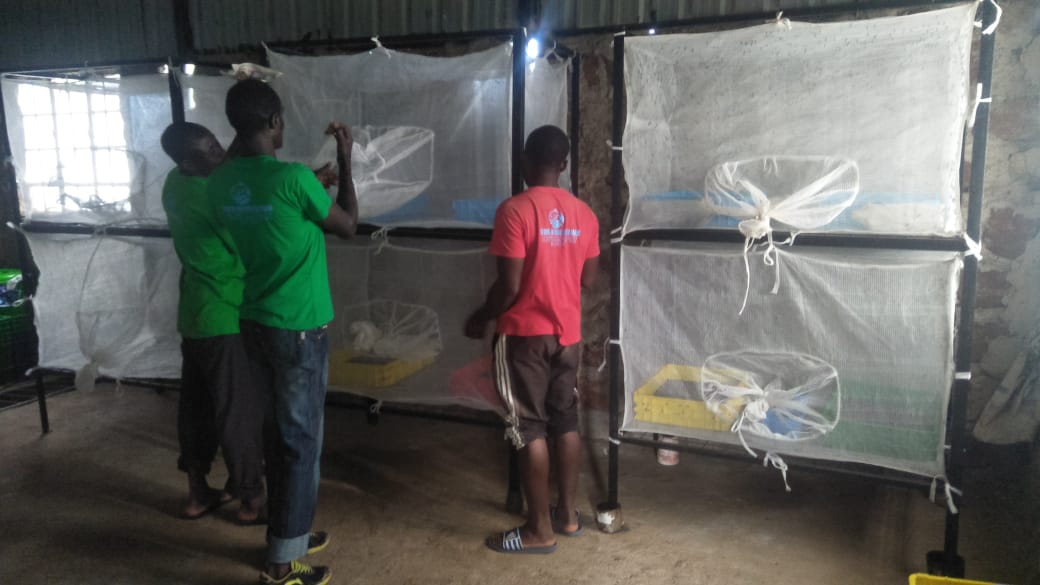
By George Munene
Busia Hydro Victory Fish Farm is pioneering the making of insect-based feed by incorporating black soldier flies (BSF) into fish feeds. This offers farmers a better-rounded fish meal that is up to 30 per cent cheaper than traditional feeds.
While most fish feeds in the market retail for Sh150 per kilogram, the Port Victoria located farm's feed costs Sh100 a kilo with an average protein content of 40 per cent.
In 2020, Fredrick Juma, the farm’s founder was at a crossroads most Kenyan farmers have become intimately familiar with: figure out how he could reduce his feed cost or exit fish farming.
“My cost of feeds was pushing 90 per cent of the overall cost of production which meant profits were almost negligible. I embarked on research on alternatives to the traditional feeds whose cost was constantly rising,” Fredrick elucidated.
That’s when he stumbled on one of the most efficient and prolific recyclers of organic waste into high-quality protein--the black soldier fly, Hermetia illucens.
Related News: Black Soldier Fly grower enlisting farmers to earn income
Related News: How to grow own black soldier larvae for feeding indigenous chicken
According to ICIPE senior scientist Dr. Chrysantus Mbi Tanga, the flies fed on waste and are harvestable after 14 days can offer a cheaper and even better source of animal protein.
Research has shown ground BSF larvae contain 45 per cent protein and 37 per cent fat.
“We hatch the eggs and give them to farmers who raise them up to their larvae stage when we buy them back. We are currently producing 150 to 200 kilograms of larvae monthly,” he informed.
According to Juma, they have observed improved mortality in their fingerlings upon switching to the BSF-infused diet.
Given the project's early success, the farm’s major hindrance to scaling up its operations has been accessing organic waste material.
To this end, they have signed a memorandum of understanding with the Busia County government to sort and harvest waste from the town’s 10-acre dump site.
As well as providing jobs to garbage handlers, this will prove handy as a 2021 report named the county among five others grappling with management of 5,990 tonnes of waste.
The company is in discussion with large fish farms in Kisumu, Siaya, and Homabay to offtake offals from gutted fish that are often dumped and pollute the environment.
By 2050, global food demand is expected to increase by 70 per cent in order to feed 9.7 billion people; this will necessitate coming up with innovative and less environmentally stressful sources of both feed and food.
“As communities across the globe become more health conscious we are seeing increased demand for white meat at a time when capture fisheries have been replaced by aquaculture as the main fish source. The current cost of feeds however makes it untenable for most small-scale growers,’ Juma said.
The world is also increasingly aware of the threat of industrial-scale trawler fishing and large-scale soya farming to meet fish feed demand.
One decimates fish populations by capturing immature fish and grounding them to make fish meals while the latter clears out forested areas for commercial farming.Related News: Growing insect protein demand by feed makers provides ready market for farmers
“Insects are a perfect source of protein as they produce negligible greenhouse gas emissions and little water, land or heat is utilised in their production. They also do not compete with human beings for similar sources of nutrition,” explained Juma.
Hydro Victory Fish Farm charges individuals Sh3,000 and institutions Sh10,000 for training on BSF farming.
BSF larvae alone costs Sh300 a kilogram when dry or Sh200 wet.
Fred Juma, Hydro Victory Fish Farm: 254720349175
This email address is being protected from spambots. You need JavaScript enabled to view it.
















Comments powered by CComment